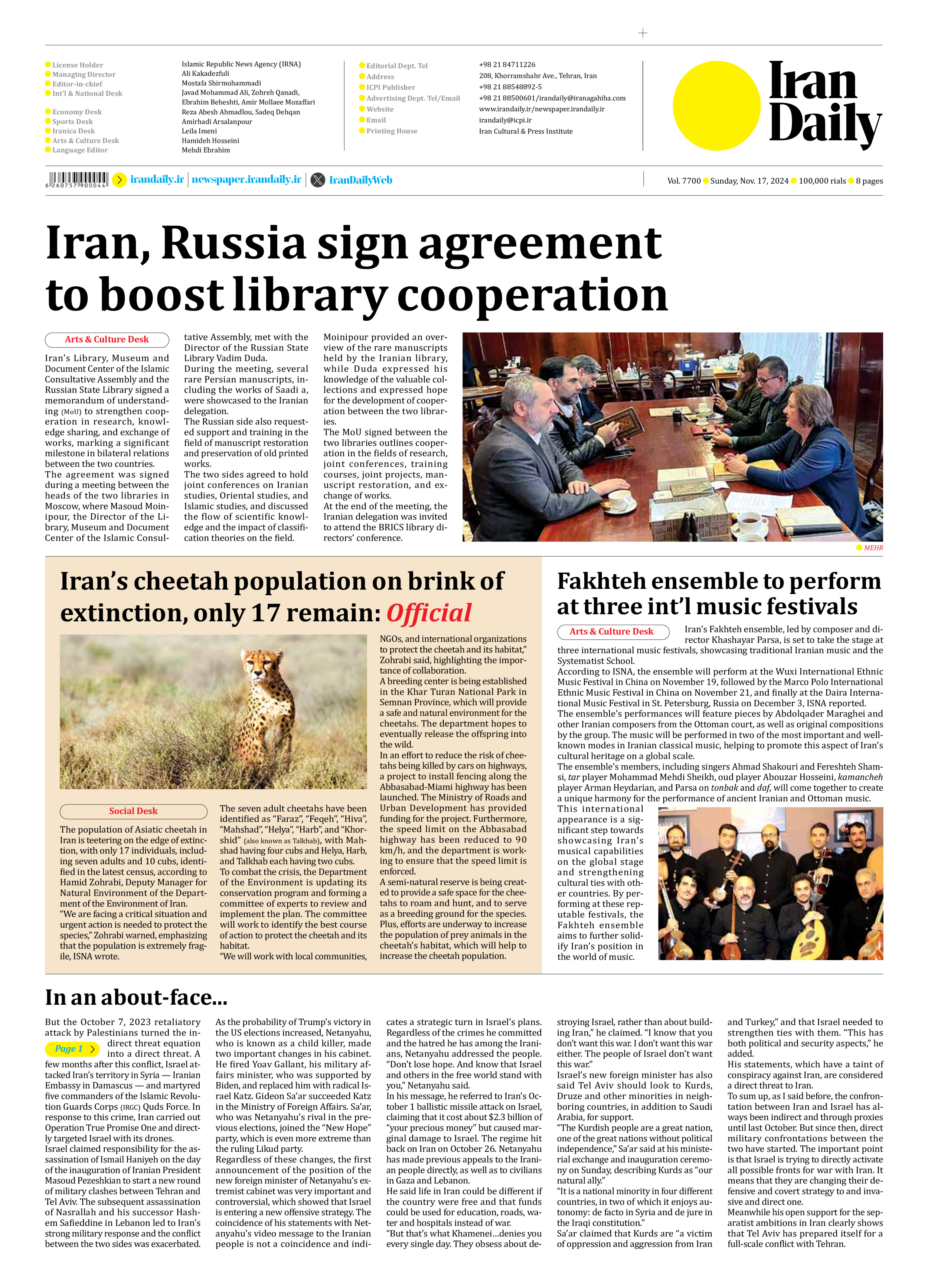
In an about-face...
Page 1
But the October 7, 2023 retaliatory attack by Palestinians turned the indirect threat equation into a direct threat. A few months after this conflict, Israel attacked Iran’s territory in Syria — Iranian Embassy in Damascus — and martyred five commanders of the Islamic Revolution Guards Corps (IRGC) Quds Force. In response to this crime, Iran carried out Operation True Promise One and directly targeted Israel with its drones.
Israel claimed responsibility for the assassination of Ismail Haniyeh on the day of the inauguration of Iranian President Masoud Pezeshkian to start a new round of military clashes between Tehran and Tel Aviv. The subsequent assassination of Nasrallah and his successor Hashem Safieddine in Lebanon led to Iran’s strong military response and the conflict between the two sides was exacerbated.
As the probability of Trump’s victory in the US elections increased, Netanyahu, who is known as a child killer, made two important changes in his cabinet. He fired Yoav Gallant, his military affairs minister, who was supported by Biden, and replaced him with radical Israel Katz. Gideon Sa’ar succeeded Katz in the Ministry of Foreign Affairs. Sa’ar, who was Netanyahu’s rival in the previous elections, joined the “New Hope” party, which is even more extreme than the ruling Likud party.
Regardless of these changes, the first announcement of the position of the new foreign minister of Netanyahu’s extremist cabinet was very important and controversial, which showed that Israel is entering a new offensive strategy. The coincidence of his statements with Netanyahu’s video message to the Iranian people is not a coincidence and indicates a strategic turn in Israel’s plans. Regardless of the crimes he committed and the hatred he has among the Iranians, Netanyahu addressed the people. “Don’t lose hope. And know that Israel and others in the free world stand with you,” Netanyahu said.
In his message, he referred to Iran’s October 1 ballistic missile attack on Israel, claiming that it cost about $2.3 billion of “your precious money” but caused marginal damage to Israel. The regime hit back on Iran on October 26. Netanyahu has made previous appeals to the Iranian people directly, as well as to civilians in Gaza and Lebanon.
He said life in Iran could be different if the country were free and that funds could be used for education, roads, water and hospitals instead of war.
“But that’s what Khamenei…denies you every single day. They obsess about destroying Israel, rather than about building Iran,” he claimed. “I know that you don’t want this war. I don’t want this war either. The people of Israel don’t want this war.”
Israel’s new foreign minister has also said Tel Aviv should look to Kurds, Druze and other minorities in neighboring countries, in addition to Saudi Arabia, for support.
“The Kurdish people are a great nation, one of the great nations without political independence,” Sa’ar said at his ministerial exchange and inauguration ceremony on Sunday, describing Kurds as “our natural ally.”
“It is a national minority in four different countries, in two of which it enjoys autonomy: de facto in Syria and de jure in the Iraqi constitution.”
Sa’ar claimed that Kurds are “a victim of oppression and aggression from Iran and Turkey,” and that Israel needed to strengthen ties with them. “This has both political and security aspects,” he added.
His statements, which have a taint of conspiracy against Iran, are considered a direct threat to Iran.
To sum up, as I said before, the confrontation between Iran and Israel has always been indirect and through proxies until last October. But since then, direct military confrontations between the two have started. The important point is that Israel is trying to directly activate all possible fronts for war with Iran. It means that they are changing their defensive and covert strategy to and invasive and direct one.
Meanwhile his open support for the separatist ambitions in Iran clearly shows that Tel Aviv has prepared itself for a full-scale conflict with Tehran.







